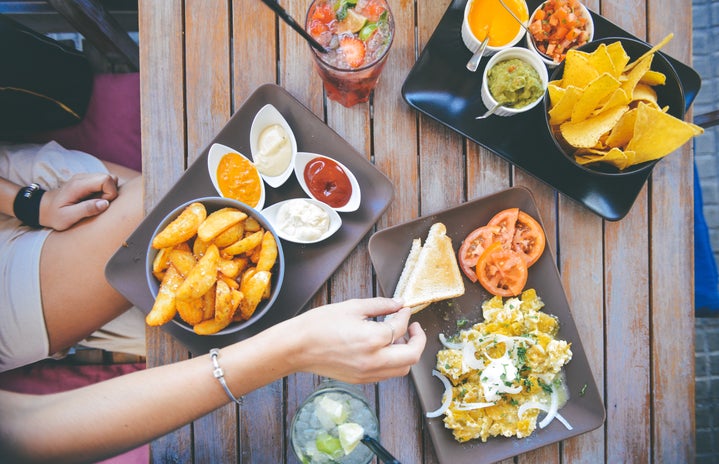One of our contributors showed up to our Her Campus pitch meeting with a bit of information that she has overheard. Apparently Aramark, our food suppliers used prison labor. We debated a little over if they use prison labor or just serve to prisoners and ultimately decided more research had to be done. So here I am and here’s what’s going on. Aramark does provide food to prisoners (and there’s issues with the quality of food that they’re providing) but they do not use prison labor. Some of you might be asking why it would be an issue if they did though. The answer to this question requires a look into the U.S. prison system.
The use of prison labor and our current issue of mass incarceration started 150 years ago at the end of the Civil War. The 13th amendment says that “neither slavery nor involuntary servitude, except as a punishment for crime whereof the party shall have been duly convicted, shall exist within the United States”. This clause serves to say that slavery is legal for prisoners. During Reconstruction, this was immediately abused. The Southern economy was demolished with the abolition of slavery since slavery was their economic system. Corporations and politicians needed cheap labor and suddenly black men were being imprisoned in droves for crimes such as loitering and vagrancy. These black bodies rebuilt the economy since they were essentially enslaved again. Additionally, prisons would lease out the inmates, a practice known as convict-leasing” to businesses who needed cheap labor. The workers wouldn’t see any of this money, it all went towards the prisons.
While no longer called “convict-leasing” today’s prison labor practices are not too different. In fact, Incarcerated Workers Organizing Committee (IWOK), a group of prison laborers working with outside help, directly calls prison labor “slavery”. Workers are unable to unionize and also aren’t considered legal employees since according to U.S. tax code, services performed in penal institutions aren’t considered employment. Because of this, there are no laws regarding minimum wage and prisoners don’t have any worker’s rights. Some prisons don’t pay inmates at all for their labor, some will pay inmates $0.02/hr, and the average is around $0.93/hr. Furthermore, prisoners suffer from a lack of workers’ rights beyond wages. In one prison in Louisiana, inmates can be forced to work under the threat of solitary confinement, loss of visitation time and the loss of “good time,” which would have decreased their sentences. The Atlantic notes the lack of “constitutional rights,” calling their labored “forced…punishment for their crimes”.
On IWOK’s website, they write:
“As incarcerated workers, we are some of the most exploited workers in the country. There is no minimum wage for prison labor….Up to 80% of wages can be withheld by prison officials. There are very few safety regulations and no worker’s compensation for injury on the job. While in prison, we try to earn money to support our families, ourselves, and pay victim restitution yet these wages prevent us from that. We believe that as workers we are guaranteed the same protections and wages as other workers”.
The work that prisoners do covers a broad range. Some inmates work for the prison itself, others do public work which helps balance state budget cuts, and others work with outside corporations. The Economist reported that the Federal Bureau of Prisons, though their corporation Federal Prison Industries, makes inmates work for an average of $0.90/hr making items for other government agencies. Their labor turned a profit of five million dollars in 2016. Outside corporations that use prison labor (Starbucks, Victoria’s Secret, AT&T) receive tax credits, get cheap labor since there’s no minimum wage for prisoners, and their products can be labeled Made in the USA.
Prison labor is a multibillion dollar industry, essential to our economy like slavery. 13th, Ava DuVernay’s Netflix documentary, states that once someone is incarcerated, they essentially become a slave of the state. In fact, there are more black men incarcerated today than there were slaves in 1850. Our country’s reliance on prison “slavery” has ties to our legislation as well. ALEC, the American Legislative Exchange Council, is a lobbying group made up of conservative politicians and companies. This “club” works to create laws for their members to push for and in fact, a quarter of state legislators is affiliated with ALEC. Most often, these bills they are trying to enact, benefit the corporate funders of ALEC. One of these funders was the Corrections Corporation of America (they left ALEC after NPR published an exposé). CCA is a private prison which makes turns a profit and make contracts to work with states. CCA works with ALEC in support of bills that lead to mass incarceration. They’ve supported mandatory minimum sentencing, three strikes and you’re out, and bills that give police the right to stop anyone who looks like an immigrant. These laws target poor communities and people of color, while benefitting CCA since they make money off of prisoners. CCA uses and supports prison labor since it adds to their income. Additionally, states working with CCA have to pay a fee if they don’t keep prisons full so it’s in their best interest to arrest as many people as possible.
The rise of private prisons and the legislation pushed by them is directly related to America’s problem of mass incarceration and the historical abuse of minorities. The U.S. holds 5% of the world’s population but 25% of its incarcerated population. Black men make up 6.5% of the U.S. population but 40% of the prison population and are about 5 times more likely to have a lifetime sentence than a white man. This is a systemic problem that prison labor feeds.
To leave you with the words of the Incarcerated Workers Organizing Committee:
“We are legally slaves. If you’ve been to prison you’d know we are treated like slaves. Billions are made annually off our backs…You cannot change this situation through a grievance process that doesn’t work…or through courts that are clearly against you…or through petitions to lawmakers who don’t care about you because you don’t vote…or through hunger strikes against prison officials who want you to starve…or through letters to newspapers who have ignored this situation for decades”.


